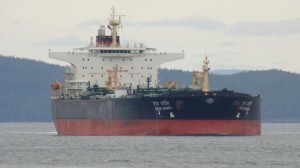 (Reuters) - Essar Group, a $39 billion Indian conglomerate, is looking to tap frozen Iranian oil revenues to pay for its�steelexports to Tehran, in a novel attempt to work around Western financial sanctions against the OPEC member state.
(Reuters) - Essar Group, a $39 billion Indian conglomerate, is looking to tap frozen Iranian oil revenues to pay for its�steelexports to Tehran, in a novel attempt to work around Western financial sanctions against the OPEC member state.The National Iranian Oil Company (NIOC) proposed the payment mechanism in August, potentially opening a new way to release oil export proceeds tied up in�India�under Western sanctions linked to Tehran's disputed nuclear program.
According to industry and government sources, and letters reviewed by Reuters, Essar has asked the Indian government to free it from paying its share of oil dues to�Iran, and instead offset them against a $2.5 billion deal to supply�steel�plate to a NIOC affiliate.
The back-to-back scheme comes to light at a critical stage in talks between�Iran�and six world powers on its nuclear program, suspected by the West of seeking to develop an atomic bomb. Iran denies this. Negotiators this week extended talks on a deal to mid-2015, and with it an interim agreement allowing Iran to be paid for some of its oil exports.
NIOC declined to comment when contacted by Reuters for this article. India's�financeministry declined to comment.
Supplying steel to Iran is "prohibited", while dealing with NIOC "is very likely to fall foul of European Union and U.S. sanctions legislation," said Jonathan Moss, partner and head of marine and trade at law firm DWF in London.
Another London-based lawyer who has advised Indian firms supplying Iran, however, said progress in the nuclear talks could soften the West's resolve.
"I don't see it being covered by sanctions," said Sarosh Zaiwalla, founder of Zaiwalla & Co. "Unless it can be alleged by the Americans that the steel is being used for nuclear proliferation, it would be a perfectly legal transaction."
At a Nov. 3 meeting at India's oil ministry, which included the commerce and�financeministries and oil refiners, agreement was reached in principle on the deal, subject to final government approval, oil ministry sources said.
ARM'S LENGTH
Critical to the oil-for-steel deal's viability is whether its two parts are conducted at arm's length, as argued by Essar, which was founded in 1969 by brothers Shashi and Ravi Ruia and now spans steel, energy, infrastructure and services.
Essar Oil (ESRO.NS) said it imported oil from Iran in its normal course of business and paid for it in line with an agreement between Iran and�India. Essar Steel India Ltd [ESRG.UL] exports steel plate to Iran through the State Trading Corporation of India (STC) (STCI.NS).
"This is in conformity with export-import policy of the Government of India.�It is not a barter deal," Essar said in an e-mail response to questions from Reuters.
The transaction could become a test case for the 'smart' sanctions imposed from 2012 by the United States and the European Union to increase pressure on Tehran to comply in the nuclear talks. India is not a party to these measures, but does back�United Nationssanctions intended to prevent Iran from acquiring nuclear equipment and materials.
Companies like Essar adhere to the Western sanctions, though, to avoid any negative fallout for their U.S. businesses. In 2007, Essar, which owns a steel plant in Minnesota, backed out of plans to invest in Iran's energy sector following U.S. objections.
The U.S. Treasury's spokeswoman on sanctions, Hagar Chemali, declined to comment on the proposed Essar deal.
The Iran Freedom and Counter-Proliferation Act of 2012 lists steel as a�commodity�subject to sanctions.
SANCTIONS SHUFFLE
India settles 45 percent of its oil trade with Iran in rupees, with the rest held back by the refiners who buy the oil. These unpaid funds are released as and when the West allows Iran access to them.
Essar Oil buys oil from NIOC, while Essar Steel agreed in January to supply steel plate to Iranian Gas�Engineering�and Development Co (IGEDC), a NIOC affiliate.
Deliveries of steel began in May, said a knowledgeable person at STC, adding that steel worth $100 million had been shipped so far. A source at the oil ministry valued the sales at $550 million.
Ghadir Movahedzadeh, NIOC's financial director, proposed drawing on the 55 percent tranche of oil dues to pay for the steel deliveries in a letter to Essar Oil dated Aug. 26.
In the letter, a copy of which was reviewed by Reuters, Movahedzadeh suggested Essar Oil could settle $1 billion in payments through this mechanism, and asked the company to obtain approval from the government and Reserve Bank of India to do so.
Essar subsequently approached the finance ministry to seek exemption from hefty local taxes on the oil funds that it is seeking to draw in payment for the steel exports.
By Reuters
The Iran Project is not responsible for the content of quoted articles.










